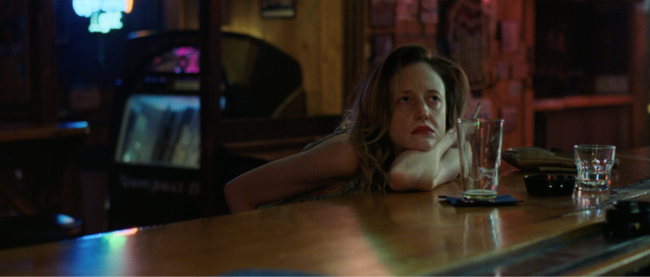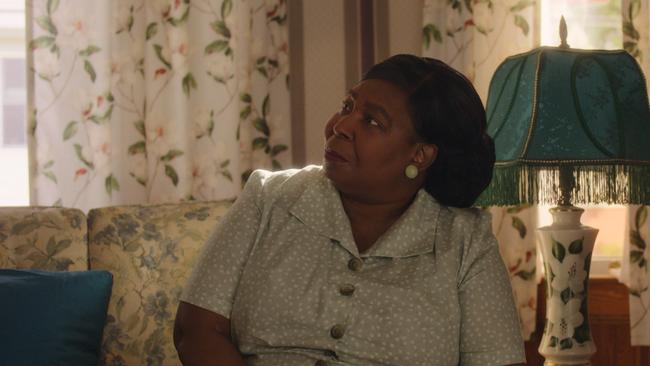Andrea Riseborough plays alcoholic single mother who blows $190k lottery win
Andrea Riseborough is Oscar-nominated for playing a mother who steals from her own son in To Leslie, while Whoopi Goldberg stars in an important film about racism.

To Leslie (M)
In cinemas from Thursday
★★★★
When Andrea Riseborough was nominated for an Oscar for Best Actress for the film To Leslie a surprising number of commentators claimed they’d never heard of her. British-born Riseborough has been making her mark in film and television for nearly 20 years and has appeared with distinction in British films (Never Let Me Go, Happy-Go-Lucky, Brighton Rock) as well as American films (Birdman). She was particularly effective as Wallis Simpson, the woman behind the abdication of King Edward VIII, in the flawed but intriguing W.E. (2011), which was directed by Madonna.
More recently Riseborough impressed in Amsterdam. In fact, she may well be as versatile as Cate Blanchett, the actor who will probably win the Oscar for which Riseborough is nominated.
To Leslie is set in West Texas and in the opening sequence single mum Leslie has just won $190,000 in a lottery. A television reporter asks her what she plans to do with the money and she answers that she’ll buy a house for her and her 13-year-old son and “have a better life”. She does neither. The film then jumps forward six years as Leslie is being forcibly ejected from the motel where she’s been living because she hasn’t paid her bills. Where did the money go? It was spent on booze; Leslie is a hopeless alcoholic.
At this early stage of the film you would be forgiven for wondering why you should invest a couple of hours in the company of a woman whose addiction has made her so irresponsible, but very soon director Michael Morris, making his first feature film after some well-regarded television – House of Cards, Better Call Saul – and screenwriter Ryan Binaco succeed in transforming a desperately needy woman into an emotionally rich case study. Binaco based the character on his mother.
With all her worldly possessions packed into a pale pink suitcase, Leslie heads for another town where her son, James (Owen Teague), now aged 19 and working on a construction site, is living. Mother and son haven’t seen much of each other in recent years, but James reluctantly allows Leslie to stay in the small apartment he shares with Darren (Catfish Jean) on the condition that she doesn’t drink, a condition she quickly ignores – in fact when left on her own in the apartment she searches for, and finds, some cash with which to pay for her addiction.
James, a finely conceived and acted character, is deeply conflicted. On the one hand he clearly loves his mother and on the other he loathes what she’s become. With Darren’s support, and some intervention from the police, he sends Leslie away, back to the town where she grew up, persuading her former friends Dutch (Stephen Root) and Nancy (Allison Janney) to take her in.
It’s not a happy situation – Nancy is virulently hostile – but matters take a turn for the better when Leslie, while sleeping off the previous night’s boozing outside a motel, encounters Sweeney (Marc Maron), the kind and gentle motel manager, who sets about helping her.
I realise that I’ve probably made To Leslie sound exceedingly grim and depressing but, strangely, it’s not. Yes, Leslie is a quick-tempered, foul-mouthed character in the early part of the film but when kindness and sympathy are shown to her she gradually transforms into a better person. Riseborough’s performance is very fine indeed, as she captures all the flaws and attributes of a woman who’s had a very tough life, a woman who has been her own worst enemy, but who somehow survives and endures.
-
Till (TBA)
In cinemas from Thursday
★★★★
The corrosive racial hatred that characterised much of the American South in the first half of the 20th century, epitomised by the murderous activities of the Ku Klux Klan, resulted in the countless lynchings, shootings and other forms of murder perpetrated on African-Americans by born-to-rule white men.
One of the most shocking and despicable such atrocities was the 1955 kidnapping and murder of 14-year-old Emmett Louis Till in the small Mississippi town of Sumner (“A great place to raise a boy” as the town sign claims).
The Till family had long since left their Mississippi background and moved north to Chicago where Emmett (Jalyn Hall) was raised by his mother, Mamie (Danielle Deadwyler) to stand up for himself in a community where racism, though not entirely absent, was not a great problem.
Overcoming a stutter, the boy was self-confident, mature for his age and a bit cheeky.
He’s excited when it’s suggested that he spend a few weeks holiday with his cousins in Mississippi; Mamie is doubtful, but grandmother Alma (Whoopi Goldberg) encourages the trip which will allow the boy to experience something of the family’s background.
Mamie warns her son that they have different attitudes in the South: “Be small down there,” she advises him before he sets off by train accompanied by his great-uncle Mose (John Douglas Thompson). Tragically, as it turns out, Emmett is too outgoing to be “small” and it’s not long before he has cheekily offended, Carolyn (Hayley Bennett), the wife of a shopkeeper.
It’s not long afterwards that Mose’s home is invaded by armed, angry whites and Emmett is taken away, never to be seen again alive.
Emmett’s body is recovered from the Tallahatchie River.
Mercifully director Chinonye Chukwu doesn’t show what happened to the boy on screen, though what we learn later is loathsome enough. The remainder of the film focuses on Mamie as she travels to Sumner to attend the funeral of her son, insisting that the body must lie in an open coffin.

In the agonising weeks that follow, Mamie evolves from a quiet, law-abiding mother into a traumatised, bereaved woman and eventually into an angry political activist who accepts the support and advice from the NAACP (National Association for the Advancement of Coloured People).
Deadwyler gives an immensely impressive performance in the role. The film builds to the trial of the white men accused of killing her son, a trial overseen by a clearly unsympathetic judge and an all-white jury.
The screenplay, by the director in collaboration with Michael Reilly and Keith Beauchamp, is filled with rich detail, such as the different ways in which attendees at the trial are treated according to their colour.
This story has been told before in books and documentary films – including The Untold Story of Emmett Louis Till (2005) made by one of this film’s screenwriters, Keith Beauchamp. So why revisit the painful material now?
Perhaps because vicious racism is alive and well in many parts of the world but also because it took 67 years for the Emmett Till Anti-Lynching Act to be signed into law – almost exactly a year ago – an Act that, for the first time, made lynching a federal hate crime.


To join the conversation, please log in. Don't have an account? Register
Join the conversation, you are commenting as Logout